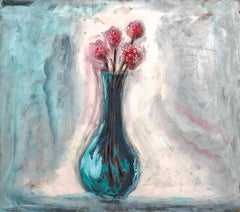Mariam Lomidze
Recent Sales
2010s Neo-Expressionist Figurative Paintings
Oil, Wood
2010s Neo-Expressionist Still-life Paintings
Wood, Oil
2010s Abstract Black and White Photography
Black and White
2010s Neo-Expressionist Black and White Photography
Black and White
21st Century and Contemporary Neo-Expressionist Portrait Paintings
Canvas, Oil
21st Century and Contemporary Neo-Expressionist Landscape Drawings and W...
Watercolor
2010s Neo-Expressionist Figurative Paintings
Oil, Canvas
21st Century and Contemporary Neo-Expressionist Figurative Paintings
Watercolor
2010s Neo-Expressionist Portrait Paintings
Oil
A Close Look at Neo-expressionist Art
A resurgence of interest in Expressionism, Pop art, Surrealism, Abstract Expressionism and other movements gained steam among artists of the 1970s and ’80s, in part as a reaction to the austerity of the prevailing minimalism and Conceptual art of the era. A decadent, bold and brash art style called Neo-Expressionism saw painters returning to figural representation, creating highly textured works that were imbued with intensely personal narratives.
Neo-Expressionist paintings are sensuous in nature and highly subjective in meaning. Expressive brushwork, highly pigmented colors and layered forms and materials lent sculptural attributes to the work and were used to depict symbolic narratives from history, mythology and the artist’s personal experience.
Prominent figures such as Jean-Michel Basquiat led the Neo-Expressionist movement in the United States with paintings and prints that were raw, emotional and often violent in nature. In Germany, Die Neuen Wilden (the “New Fauves”) was the name given to a group of postwar artists that included the likes of sculptor Georg Baselitz and Gerhard Richter, a painter and photographer who explored the possibilities of both abstraction and realism, sometimes in a single piece. The work of the New Fauves — labeled as such for its return to Fauvism’s textured brushwork and use of vibrant colors — shares commonalities with Neo-Expressionism, and Baselitz was a pioneer of the movement in Europe. In addition, Willem de Kooning’s pulsating action paintings and Julian Schnabel’s experimentation with the materiality of paintings also took shape during this period.
“I was trying to make paintings different from the paintings that I saw a lot of at the time, which were mostly minimal, and they were highbrow and alienating, and I wanted to make very direct paintings that most people would feel the emotion behind when they saw them,” said Basquiat.
Neo-Expressionism generated some polarizing opinions, with some celebrating the revival of personal subjectivity in art while others criticizing the movement for being too commercially driven and nostalgic. But most experts agree that Neo-Expressionism was a huge commercial success and culturally impactful, paving the way for the postmodern work of artists like Richter and Sigmar Polke.
Find original Neo-Expressionist paintings, prints, mixed-media works and other art on 1stDibs.
